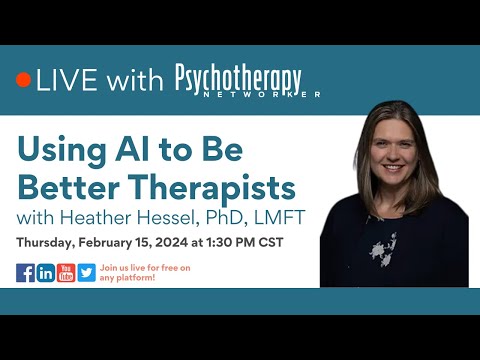The idea of AI stepping into therapy rooms sounds like something out of a sci-fi movie, right? Yet, with AI advancements happening everywhere, many are wondering: Will AI Replace Therapists? This isn't just a technical question; it touches on the very core of human connection and care. Let's unpack the reality behind the hype.
This post dives into what AI is already doing in the therapy world - from handling paperwork to assisting with initial assessments. We'll also explore the unique human skills AI simply cannot mimic, like true empathy and complex emotional understanding. Finally, we'll look at how therapists can partner with AI, not compete with it, to shape the future of mental health support.
Table of contents
Therapists Speak Out: AI's Role in Their Future
The arrival of AI in therapy has stirred mixed feelings among mental health professionals. A study highlighted that 56% of therapists would prefer not to work with AI, fearing it lacks the emotional connection necessary for effective therapy. Many therapists argue that while AI can assist with administrative tasks or preliminary assessments, it cannot replicate the human touch, which is a key component of the therapeutic alliance (Chronicle of Evidence-Based Mentoring).

Credits: KQED
On the flip side, some therapists are cautiously optimistic, viewing AI as a useful tool to enhance their practice. According to a recent survey, therapists believe that AI can help alleviate the mental health access crisis by providing immediate support where human therapists are in short supply (Newsweek). They recognize the potential of AI to handle certain tasks while keeping the core therapeutic work human-centered.
What parts of Therapist is AI replacing?
AI is transforming aspects of therapy by automating several tasks traditionally performed by therapists. For instance, AI can assist in assessment and diagnosis by analyzing patient data to identify mental health conditions more accurately. According to a Frontiers in Psychiatry article, AI-driven tools can offer therapeutic interventions such as chatbot-delivered cognitive behavioral therapy (CBT), providing immediate support to users.

Credits: Frontiers in Psychiatry
AI also plays a role in automating administrative tasks like scheduling, billing, and clinical documentation, allowing therapists to focus more on patient care. As noted by the APA Services, AI tools can streamline note-taking by converting rough notes into formal reports, reducing the time therapists spend on paperwork. Furthermore, AI can support patient monitoring by tracking progress and providing data-driven insights, potentially enhancing treatment outcomes.
What parts of Therapist AI cannot replace
Despite the advancements in AI, therapists bring unique skills to the table that technology cannot replicate. One such skill is the ability to form deep, empathetic connections with clients. According to a discussion on Quora, the therapeutic relationship is built on empathy and understanding, which is something that AI, with its limitations in interpreting non-verbal cues and nuanced human emotions, struggles to replicate.
Therapists are also adept at navigating complex emotional landscapes, a skill AI currently lacks. The article on Psychotherapy.net highlights how human therapists excel in adapting their approaches based on nuanced interactions and cultural contexts. Additionally, AI systems, while useful, can sometimes misinterpret these nuances, which can lead to inappropriate responses.
Ethical considerations are another area where human therapists shine. Therapists make judgment calls that involve confidentiality and ethics, areas where AI is not yet equipped to handle with the same level of sensitivity. The article from the American Psychological Association emphasizes that while AI can assist with certain tasks, the need for human oversight ensures that therapy remains personalized and responsibly managed.
How Therapists Can Adapt to AI
As the mental health landscape evolves with AI, therapists can expect to incorporate more technology into their practices. AI tools are already transforming tasks such as assessment, diagnosis, and client monitoring. According to a study published in Frontiers in Psychiatry, AI can analyze patient data for accurate diagnosis, provide cognitive behavioral therapy through chatbots, and track patient progress with data analytics. While AI enhances efficiency, it cannot replace the empathy and personalized care that human therapists offer.

Credits: Photo by ThisIsEngineering
Therapists should focus on learning how to integrate AI tools into their practice effectively. As noted by Psychotherapy Networker, AI can assist in documentation, idea generation, and client triage, allowing therapists to concentrate on complex cases. Moreover, training in technology use and interdisciplinary collaboration with AI developers ensures ethical AI development. Emphasizing human connection remains key, as it offers the empathy and understanding that AI lacks.
Therapist Hiring Trends in the US
The job market for therapists in the US is experiencing significant growth, fueled by increased mental health awareness and expanded insurance coverage. Job openings for behavioral health professionals, including licensed therapists, have surged over 20% in the past year, according to LinkedIn. The broader healthcare and social assistance sector has been a strong driver of employment, adding 1.35 million jobs between July 2023 and July 2025 Indeed Hiring Lab.

Credits: Getty Images / Indeed Hiring Lab
Current data shows approximately 159,770 active therapist job openings and 114,386 mental health therapist openings nationwide. This demand extends to specialized roles, with substance abuse and mental health counselors projected to grow 18%, creating about 42,000 openings annually through 2032. Physical therapy also anticipates 13,600 new openings each year through 2033, despite a reported shortage where 72% of practitioners cannot meet local demand.
Employers are responding to this need by adopting skills-based hiring and offering flexible work arrangements, including telehealth opportunities Indeed's 2025 US Jobs & Hiring Trends Report. Telehealth is now a permanent part of behavioral healthcare, creating new avenues for remote care LinkedIn. This market values adaptable professionals as it navigates economic shifts and the influence of AI tools.
Is Therapist AI safe?
Despite the technological leaps in artificial intelligence, the role of human therapists remains largely irreplaceable. Studies have shown that AI chatbots, like ChatGPT, are not yet safe substitutes for human therapists. They struggle with things like crisis response and interpreting nuanced human emotions, which are critical elements of effective therapy (University of Minnesota). Moreover, AI's current inability to emotionally connect with patients highlights the necessity of the human element in therapy.

Credits: KQED
On the other hand, AI can be a valuable asset in specific areas of mental health care. It can assist with administrative tasks, initial assessments, and patient monitoring, thus allowing therapists to focus more on the therapeutic relationship (Frontiers in Psychiatry). However, true therapy involves empathy and understanding, which AI, for all its skills, cannot yet replicate. As the technology and regulations continue to evolve, therapists are encouraged to integrate AI tools into their practice to enhance, not replace, their role (Psychology Today).
Hiring Therapists? Here's what to look for
In today’s digital age, hiring a therapist requires a keen eye for both traditional and tech-savvy skills. Besides strong interpersonal and therapeutic skills, look for candidates who are comfortable integrating AI tools in their practice, which enhances service delivery. Using Adaface's Therapist test can help you evaluate these capabilities effectively.

Credits: Blueprint AI
A therapist should also possess cultural competency, trauma-informed care skills, and adaptability to new therapeutic trends. Adaface’s Prompt Engineering Test can assess a candidate’s ability to integrate AI into their practice, ensuring they are capable of leveraging technology to improve client outcomes.
Screening candidates with Adaface's Generative AI Test can provide insights into their proficiency with AI tools. This test helps ensure that prospective hires are not only skilled in traditional methodologies but are also prepared to navigate and utilize the latest advancements in technology for enhanced client care.
Prompt Engineering Test
Generative AI Test
Therapist Psychometric Test
Why Therapists Should Embrace AI's Potential
AI holds exciting possibilities for the world of therapy, offering tools that can enhance rather than replace the human touch. According to a report from TherapyCloud, AI can streamline routine tasks like scheduling and documentation, freeing therapists to focus on the nuanced, empathetic connections that are their specialty.
Credits: Elsevier
For those hiring in the mental health sector, AI offers an opportunity to broaden the scope of what therapy can achieve. With AI tools improving diagnostic accuracy and tracking treatment progress, employers can deliver more personalized care without additional strain on their human resources. As therapists adapt to these technologies, they can expand their skillsets and enhance the therapeutic process for their clients.
The future is bright for therapists ready to embrace AI's potential to transform mental health care. As more professionals integrate AI into their practice, the balance of technology and empathy will create new, dynamic opportunities to reach more people in need. The key to navigating this evolution lies in combining AI's capabilities with human insight, ensuring that therapy remains a deeply personal journey.

40 min skill tests.
No trick questions.
Accurate shortlisting.
We make it easy for you to find the best candidates in your pipeline with a 40 min skills test.
Try for freeRelated posts



